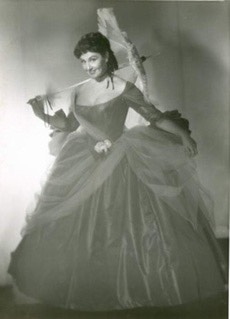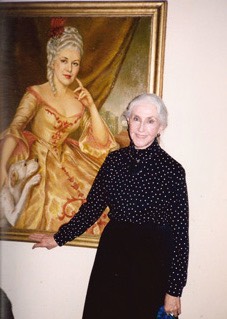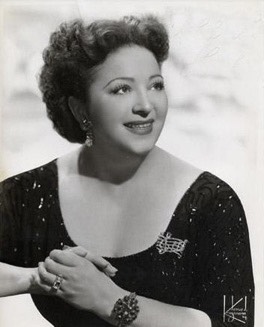
As Dorabella in Così fan tutte

By her beloved friend Eleanor Steber’s portrait
in Founder’s Hall, Metropolitan Opera
When this wonderful American artist, as Princess Eboli in Verdi’s Don Carlo,
cursed the fatal gift of her own allure (“O don fatale”), no suspension
of disbelief was necessary. Blanche Thebom was indeed a beauty. We met
at the time of her twentieth anniversary at the Met in 1964, when her
career as one of the world’s foremost mezzos was winding down and she
was singing, for the most part, important character roles. In an
operatic repertory that ranged from Handel and Mozart to Berg and
Stravinsky, she cut a wide swath internationally during the two decades
of her greatest celebrity. She even went as far as to sing the soprano
role of Elisabeth in Tannhäuser (at the Royal Opera in
Stockholm, a tribute to her Swedish antecedents). She adored Zinka
Milanov, professionally and personally, as much as I did (one of her
“greatest fantasies,” she always said, was to hear Zinka sing
Elisabeth—“If she did, I would go from anywhere in the world to anywhere
else in the world to hear her”), and she, too, loved to tell Zinka
stories. The two sang together so often for so many years that there was
more than ample opportunity for observation. Many’s the time we swapped
stories—real ones, from our own considerable experience, infinitely
more human (and, yes, usually amusing) than those of the apocryphal sort
that have proliferated into a vast storehouse of anecdotes that seem
designed to ridicule rather than reveal. A Thebom favorite: one night at
some sort of reception, Zinka, Blanche, and the latter’s then husband,
Richard Metz, were chatting over cocktails. Metz couldn’t keep his eyes
off Zinka’s extraordinary brooch, a diamond-studded treble clef perched
on a platinum music staff and pinned at the edge of her very décolleté
gown. He kept questioning her about it and leaning over to look at it
more closely. Batting her eyelashes, in her most honeyed, coquettish
tone, she asked at last, “Richard—vhich one of my treasures are you
admiring?” BT had brains as well as talent. After retiring from the
stage, she was briefly director of the Atlanta Opera. In that post, in
the manner of Eleanor Roosevelt and Harry Truman, she did all her own
correspondence. Such personal attention to the tiniest detail wore her
out, and she went on to other places and endeavors (finally to San
Francisco, her home for the last three decades of her life), but always
in music and always with the intention of making things better for the
art form she so loved. With her death at ninety-four on 23 March 2010,
we lost one of our most ardent advocates for two particular, special
causes: young female singers and arts education for all American youth.
The ardor, the advocacy, the warm dear lady herself will long be missed.

Zinka Milanov displays her treble-clef brooch and incidental treasures